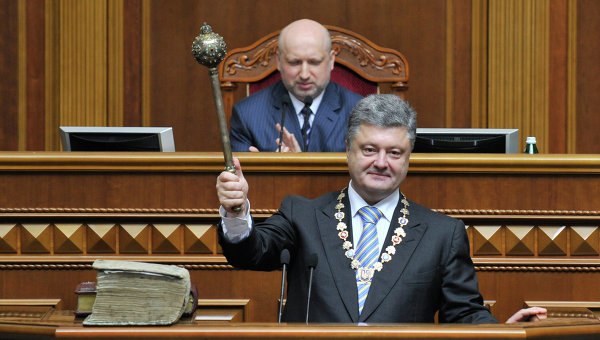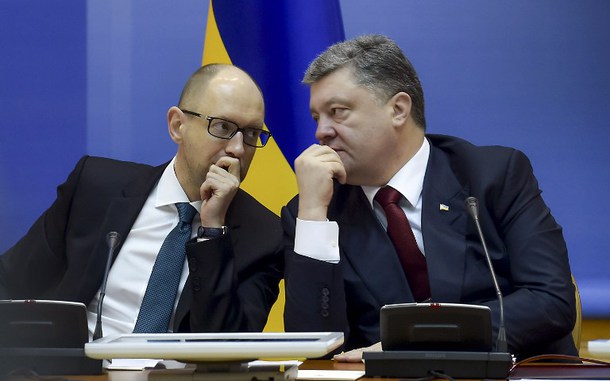On 7 June 2014, Petro Poroshenko was inaugurated as President of Ukraine. Two years ago nobody would doubt that he was a favorite of the election. After the disgraced then-President Yanukovych fled Ukraine’s capital, Poroshenko won the elections in a landslide, with 54.7% votes in the first round. Yulia Tymoshenko, the opposition leader repressed under Yanukovych’s regime, came second with only 12.8%. The victory was predicted - all the polls showed Ukrainians favor Poroshenko, despite his less-than-prominent position during the Euromaidan protests.
Poroshenko received two challenges with his inauguration - to reform Ukraine and overcome the war. Over two years, he was held responsible for all of Ukraine’s mistakes and victories, no matter whether they were his work or not. Behold, one of the most prominent Ukrainian trends was born - the bipolar “peremoha” (victory) - “zrada” (betrayal) syndrome.
Read also: Betrayal or Victory: what did 2015 bring for Ukraine?
We asked ordinary Ukrainians on the streets of Kyiv to grade the President's work by answering 3 questions:
- What were the weak points of his presidency?
- What successful steps did he make?
- Would you vote for him if the election is taking place now?
The answers of our respondents were controversial, just like the two-year path of Mr. Poroshenko. For example, some assessed the steps for reforming the judiciary at the beginning of the summer as a total betrayal, and some - as a true victory.
The promises he made
Reforming Ukraine’s justice sector was one of the major demands of Euromaidan protestors, with 94% of Ukrainians seeing corrupt judges as its primary problem. After two years of stagnation,the reform was finally jumpstarted on 3 June 2016 with the participation of the President. However, it was passed in a hurry that suggested the President was struggling to make his pre-election promises meet reality before the anniversary.
Read more: Ukraine’s hasty way toward judicial reform | #UAreforms
On the eve of the anniversary, Poroshenko made another step that was required a long time ago - dismissed the current Central Election Comission. However, the delay of this event negates its potential positive outcome.
The platform Slovo i Dilo [Word and Action] counted that overall being a polititian Poroshenko gave 296 promises.
126 of them are already fulfilled. Among the last ones are promises to fight for the rights of Crimean Tatars, to do everything for the release of Nadiya Savchenko, and to support any candidate suggested by the parliamentary coalition for the position of the Prime Minister. Regarding the last item, it’s more likely that the new Prime Minister Volodymyr Groysman was the only candidate whom Poroshenko was ready to accept, which is why Groysman was supported by the parliament.
70 promises have not been fulfilled. These are reaching energy independence over two years, enlarging gold reserves by $ 1.7 bn, publicizing the list of people who will be prosecuted for corruption. Among unfulfilled promises there are also those related to his own business interests and the utopic claim that oligarchs will not be able to influence Ukrainian politics.
Slovo and Dilo considers that another 100 promises are in the making. Therefore, Ukrainians can still expect the return of occupied parts of Donbas and Crimea in nearest future, achieving a visa-free regime for Ukrainians in 2016, and prosecuting the disgraced president Victor Yanukovych in absentia from Poroshenko.
What people think
The survey conducted by the TNS Online Track reveals that Ukrainians' satisfaction by Poroshenko index dropped twofold during the last two years.
The first significant drop in the index was observed in August 2014. It is likely the acute period of the Anti Terrorist Operation (ATO) and significant losses of Ukrainian army influenced how Ukrainians perceive their President.
In general, any significant drop in the index in the majority of cases reflected negative trends in the country, like the situation in the ATO, increased utility rates, rising dollar rates, uncertainty of visa-free travel and others, say the authors of the survey.
Another survey conducted by the by the Ilko Kucheriv Democratic Initiatives Foundation and the Razumkov Center from May 11-16, 2016 shows that trust in the president continues to fall: from +5% in December 2014, -40% in December 2015 to -48% in May 2016.
Also the poll reveals that the majority of the population (61%) thinks that the political situation in Ukraine is strained, 30% say it is as critical. Only 4% consider that the situation is calm, while 0.4% say there are no problems. However, compared to July 2015 the feeling that the situation was “critical” fell by 7%, while the situation was considered strained and the threat prevails in all regions of the country.





